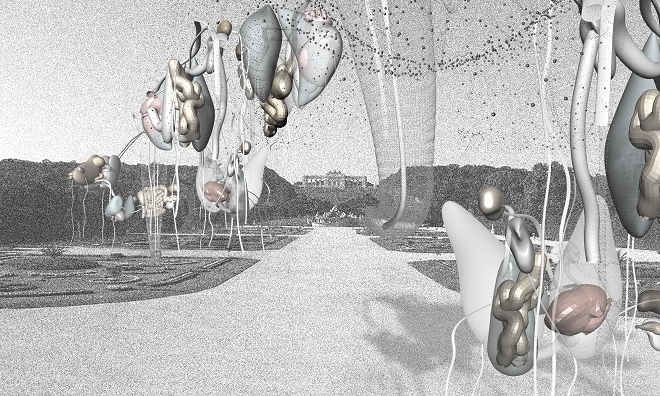ARCHITEKTŪROS FONDAS' PROGRAMME WITHIN FUTURE ARCHITECTURE PLATFORM - SENSING URBAN MATTER

Illustration: Aistė Ambrazevičiūtė
Architektūros fondas participates in the Future Architecture Platform programme Landscapes of Care by engaging with practitioners of experimental spatial practice and art with research on a variety of environmental technologies and explore the relations between cities, landscapes and information flows. Sensing Urban Matter aims to present different creative approaches to urban space and its materiality and how it is connected to wider ecosystems and global networks of logistics, through which matter, raw resources and data circulate.
The idea of a smart city propels the evolution of these networks by turning urban objects and materials into digital data. However, according to media scholar Shannon Mattern, urban spaces have combined analogue and digital spheres, “dirt and data, ether and ore”, in a smart way since ancient times. Departing from the tension between urban locality and global networks, the pre-digital smartness of the city and its materials, Sensing Urban Matter aims to research new perspectives on the relationship between urban development and natural systems, exploring urban spaces through their material and ecological histories, presents and futures and the exchanges they enable beyond the algorithmic, corporate technology-based smart space.
Movement of matter
Could urban materials offer proliferation of information in a different way than the information infrastructures that rely on extraction of resources—matter being turned into commodities—as well as obfuscate the relation to the faraway places where the urban materials come from?
As the materiality of our cities pinpoint to a variety of extractive relationships, in certain cultural discourses, one got already used to works exploring these origin sites of the city - not only stone mines, but also sites where rare minerals or copper is being extracted that is crucial for the digital infrastructures that became enmeshed in the cities as well.
The relationships that the built environment entails—from brick house to a clay deposit somewhere else—are even more complicated if one looks further into other technonatural environments of the city which may be even more elusive than the skyscraper hiding its origin pit. The movement of matter also ranges differently in the degree up to how much it can be contained within human control, even if it is induced by human actions. Whereas the construction industry humanly moves matter from one place to another; materials, particles, elements have agency on their own, depositing themselves in unforeseen bodies and landscapes, their paths escaping human control.
Human agency and communities
Material flows not only connect us to distant landscapes, it is also a connection to a distant community, where these relationships rarely are symmetrical or solidary. How do human communities actively or passively participate in these material flows and what are the ways to account for these experiences, speculating on organizational structures that bring democratic decision-makers together or foster communities?
Creativity of unexpected relations
Through the contributions of FAP fellows discovering this range of material flows and the relations they forge, we are looking into creative approaches that not only map the extractivist practices, document origin sites or uncover histories; but also work with methodologies that make new connections and relationships between materiality of urban technoecological environment and human agency.
In 2021, Architektūros fondas has invited seven collectives (10 creatives) from the Future Architecture Platform to develop and present their ideas in a few different formats: podcast and radio conversations, publication as well as engagements with local urban sites in Lithuania.
A series of podcast conversations in English will be hosted on Architektūros fondas podcast platform Aikštėje.lt. These podcast conversations will bring Future Architecture Platform fellows Rosa Whiteley, Nico Alexandroff, furii studio, Hanna Husberg and Agata Marzecova, Ivana Kralikova, Austin Wade Smith and Studio Pararaum together in dialogue with local initiatives, activists and researchers in Lithuania. The majority of the podcast participants will later be invited to contribute their research to Architektūros fondas publication in a form of visual or discursive essay. Ivana Kralikova is invited also to contribute in developing remotely an exploration of urban soil ecosystems in Kaunas, Lithuania, whereas Hanna Husberg and Agata Marzecova will run recurring online series of talks Fantasies of Seamless Interoperability, and will explore how collective environmental and social imaginaries, hopes and fantasies are shaped through invisible, yet material and very influential, infrastructure and novel ecosystems emerging at the nexus of political economy, communication technologies and the atmospheric medium in its role as a carrier of the electromagnetic spectrum. The publication and results of fieldwork with Ivana Kralikova and the talk series with Hanna Husberg and Agata Marzecova will be presented in Fall 2021.
PROGRAMME EVENTS:
September 15 Fantasies of Seamless Interoperability with Vladan Joler
September 18 Urban Hike “Dig Where You Stand: Journey into neoenvironmental Kaunas”
September 22 Fantasies of Seamless Interoperability with Miglė Bareikytė
September 29 Fantasies of Seamless Interoperability with Rahul Mukherjee
October 6 Fantasies of Seamless Interoperability with Adriana Knouf
Architektūros fondas' programme Sensing Urban Matter is part of the Future Architecture platform and European Architecture programme 2021, and is co-funded by the Creative Europe Programme of the European Union and a strategic partner Lithuanian Council for Culture.